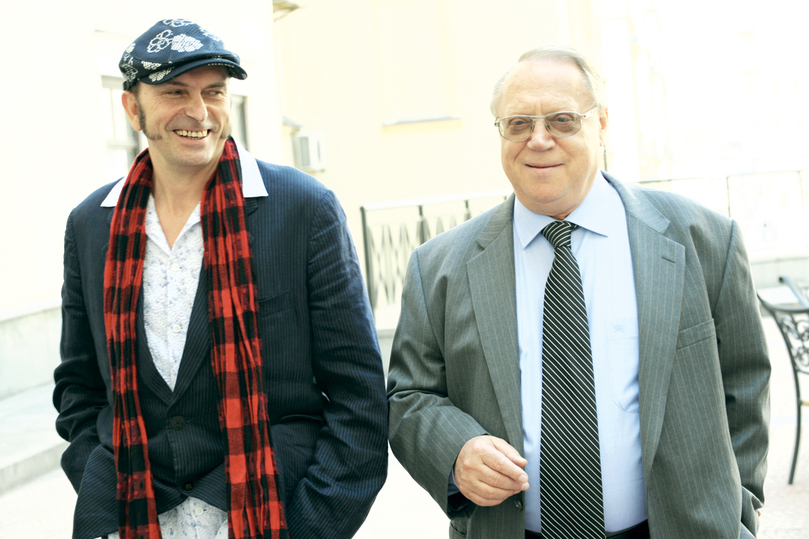The largest International Theater Festival celebrates its anniversary
[ad_1]
The International Theater Festival named after A.P. Chekhov celebrates its 30th anniversary. The event is significant – after all, this is the very first international theater forum that was born in the new Russia. He was born at a time when countries were not yet divided into friendly and unfriendly, and the theater space was common.
Those who lived in the Soviet Union and were engaged in theater went to festivals in other countries and constantly asked each other: why can’t we gather theaters in Europe and around the world? Actually, Kirill Lavrov was the first to raise this question at the Constituent Congress of the Union of Theater Workers of the USSR. He later became the president of the Chekhov Festival, and its general director was Valery Shadrin. We owe our knowledge, contacts, joint projects with the world theater to these people.
And it all started in the difficult 90s, when a powerful state lost its former power. But, as is often the case in Russia, the seemingly impossible happens in spite of it. The festival, which took the name of Chekhov, was no exception. Great masters came to Moscow in different years: Bartabas, Pina Bausch, Luc Bondy, Matthew Bourne, Peter Brook, Ivo Van Hove, Heiner Goebbels, Emma Dante, Sergey Danchenko, Declan Donnellan, Emmanuelle DeMarcy-Mota, Dominique Dromgoul, Nacho Duato, Philippe Jeanty, Jo Kanamori, Merce Cunningham, Romeo Castellucci, Frank Castorf, Otomar Krejcha, Robert Lepage, Lin Hwai-ming, Christian Lupa, Simon McBurney, Christoph Marthaler, Satoshi Miyagi, Arian Mnushkin, Joseph Naj, Eymuntas Nyakroshus, Maria Paches, Olivier Pi, Luca Ronconi, Giorgio Strehler, Robert Sturua, Tadashi Suzuki, James Thiere, Robert Wilson, Daniele Finzi Pasca, Akram Khan, Patrice Shero, Peter Stein, Andrey Shcherban, Mats Ek, Jerzy Jarocki and others.
The Russian psychological theater and the world theater became like two communicating vessels that enriched each other. With the light hand of the Chekhov Festival, Russian Seasons arose, which became an event of the Avignon Festival in the late 90s. And then there were the Japanese seasons, the cross years of cultures with the indispensable participation of the Chekhov Fest. How many interesting things were there. And how difficult it was sometimes to implement such large-scale projects.
And the Chekhov Festival is a scale, scope, ambitions that have always been justified. Valery Shadrin and his team were the first to bring Bartabas’ equestrian theater from France to Moscow. And, by the way, it turned out to be the last one – no one before or after him decided on such an adventure. When a dozen horses of a unique breed were brought to the Russian capital by a special plane, when in Kolomenskoye, on the banks of the Moskva River, a tent was smashed, stables were built, and every evening hundreds of enthusiastic spectators filled the tent.

Five performances by Robert Lepage at once took place at the Moscow Art Theater in Kamergersky Lane, and the capital audience discovered an amazing theatrical storyteller, whose many hours of stories flew by completely unnoticed by the viewer. And it doesn’t matter what they were about – about space, about the Danish storyteller Hans-Christian Andersen, or about the fate of emigrants. Years later, Robert Lepage would leave his mark on the Russian theater as well, releasing productions of Hamlet and The Master and Margarita with Yevgeny Mironov in his theater.
After showing performances by Tadashi Suzuki, the artists of the Moscow Art Theater went to his theater in Shizuoko, where the Russian-Japanese “King Lear” was born. And how many interesting works did Declan Donnellan do with our actors, and they were applauded in Europe!
The Chekhov Festival stimulated the birth of new festivals that brought new trends to Moscow and opened up new names for adult and children’s audiences. Everything has stopped since the beginning of the pandemic, when the borders were closed and life seems to have stopped. Common sense suggested that it was not a theatrical time at all, that a different form of existence and communication was offered to the world – online. And the world, guided by common sense and the instinct of self-preservation, began to master this format and even extract from it, as it seemed to it, something new. And only Valery Shadrin did not give up with his festival – he nevertheless brought to Moscow half of the program formed before the pandemic.
At what cost? Only he and his team know this, and the viewer should not know at all. Show must go on — Chekhovsky was guided by this principle, not suspecting that the covid threat is only an overture to the drama, the tragedy that the world now faces, including the theatrical one, divided into friendly and unfriendly. Where the main concepts are prohibition and opposition, and where all the rules that guided humanity are now worthless.
It is in this context that the very first and largest theater festival is celebrating its 30th anniversary. He wrote a bright, unique page in the history of the domestic and world theater and, in spite of everything, is not going to give up positions and change principles. At such a mature age, habits do not change.
We congratulate Valery Ivanovich Shadrin and his Chekhov Festival on a wonderful date and wish the festival to continue.
[ad_2]
Source link






